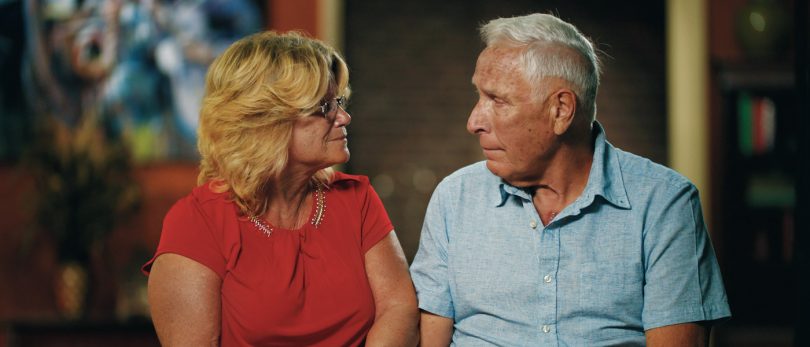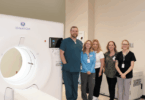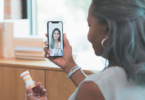Like many people in the UHS community, in July 2020 Richard Vick was wary of going to the hospital due to the COVID-19 pandemic.
“I was concerned because you heard these conversations about hospitals being loaded with COVID-19,” he says. Even as Richard experienced extreme symptoms such as being unable to breathe and having a heavy pressure on his chest, he was reluctant to go in. “I couldn’t do any work, I couldn’t drive, I couldn’t do anything,” he explains.
As his condition worsened, Richard’s wife, Linda, finally persuaded him to go to the emergency room on July 20, 2020. There, doctors diagnosed Richard with a serious heart condition that would require surgery in the next few days. And this wasn’t the only surprise in store for Richard and Linda at the emergency room.
“When I finally got to the emergency room, I realized I had nothing to worry about,” says Richard. “It was clean, everybody was very helpful, and they took care of me in a perfect manner.”
Richard found out he needed open-heart surgery, and four days later, he was on the operating table. About two weeks after his surgery, he was already feeling better.
Prevention Plan
You’re not alone if you skipped a primary care provider visit—or two—in the past year due to COVID-19. Fortunately, now is the time to take action and make sure you’re up-to-date with preventive care and screenings. Here are some general guidelines for common recommended screenings:
- High blood pressure screening – Regular screenings starting at age 18. Adults should have their blood pressure checked at every well visit.
- Cardiovascular risk counseling – Adults with cardiovascular disease risk—such as high blood pressure, high cholesterol, diabetes or obesity—should talk with their doctors about taking preventive action against heart disease.
- Blood glucose screening – Regular screenings starting at age 40 through 70 for adults who are overweight or obese. This can be part of a larger cardiovascular risk assessment.
- Colorectal cancer screening – Regular screenings starting at age 50 through 75. Screenings can be done via colonoscopy or less-invasive tests such as at-home stool tests. Ask your provider about the right option for you.
- Breast cancer screening – Screenings every two years for women who are between 50 and 74 years old and are at average risk for breast cancer.
- Cervical cancer screenings – Pap smear every three years for women who are between 21 and 29 years old. Then, Pap smear and HPV tests every five years until age 65. For women with a history of normal Pap smear results, testing can end at age 65.
“Now I’m feeling really, really well,” he says. “I’m going to be back to normal. Through this whole thing, I’ve never had any pain from the operation. I can’t say enough about [my experience]. It was terrific.”
Linda agreed. “I think he’s on a very good road to recovery,” she says. “He’s 10 times better than where he was at. And the staff made us feel very comfortable. When I was in the hospital with him, they came in and explained everything to me and took exceptional care of him.”
While Richard and Linda’s story has a happy ending, Richard’s initial reticence to get checked for his symptoms is understandably common during the COVID-19 pandemic. “The fear that was created because of the pandemic has substantially delayed healthcare across the board,” says Ahmed Khan, DO, cardiothoracic surgeon at the UHS Heart & Vascular Institute. Just as in Richard’s case, many patients who would have received screenings and checkups in 2020 missed them, which could set them up for health issues down the road.
“Preventive medicine has been proven to be successful: It saves lives and promotes life,” says Dr. Khan. “It’s simple science: If you get regular healthcare, get your A1C [blood sugar] checked, get a breast exam—you’re going to find that you live longer. If you aren’t seeking healthcare when you need it, the long-term outlook can be grim.”
So what can you do to take preventive care of yourself during the pandemic?
Dr. Khan explains that it is safe to visit the hospital or your primary care provider for a checkup or screening. “We’ve implemented a very appropriate policy in patient infection control, and I think we’ve done an immaculate job,” he says. However, Dr. Khan also recommends virtual care to anyone who may still be nervous about an in-person visit. And, in the case of an emergency, call 911.
“I believe telehealth can be a solution for preventive care, even beyond the pandemic,” says Dr. Khan. “I think the hardest part is the patient taking that initiative to reach out and start the virtual visit. If they take the time to have a virtual visit, we will find any issues and help them create a plan to manage or prevent disease.”
For Richard and Linda, Dr. Khan’s words ring true. Looking back, Richard wishes he would have taken the initiative for himself sooner. And his advice for anyone in a similar situation is clear: “If you have any kind of pains or symptoms that you think are bad, don’t hesitate to go into the hospital. They’re ready and prepared for you.”
VIRTUAL VISITS
Start a virtual visit today, and learn more about the program, at nyuhs.org/virtualhealth.







